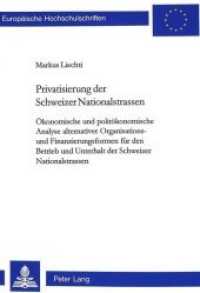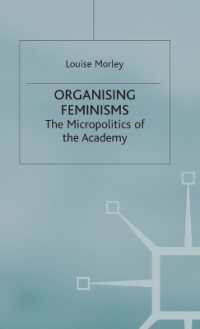- ホーム
- > 洋書
- > 英文書
- > Religion / Ethics
Full Description
God, Tsar, and People brings together in one volume essays written over a period of fifty years, using a wide variety of evidence—texts, icons, architecture, and ritual—to reveal how early modern Russians (1450-1700) imagined their rapidly changing political world.
This volume presents a more nuanced picture of Russian political thought during the two centuries before Peter the Great came to power than is typically available. The state was expanding at a dizzying rate, and atop Russia's traditional political structure sat a ruler who supposedly reflected God's will. The problem facing Russians was that actual rulers seldom—or never—exhibited the required perfection. Daniel Rowland argues that this contradictory set of ideas was far less autocratic in both theory and practice than modern stereotypes would have us believe. In comparing and contrasting Russian history with that of Western European states, Rowland is also questioning the notion that Russia has always been, and always viewed itself as, an authoritarian country. God, Tsar, and People explores how the Russian state in this period kept its vast lands and diverse subjects united in a common view of a Christian polity, defending its long frontier against powerful enemies from the East and from the West.
Contents
The Literature: Breaking the Code
1. Kurbskii and the Historians
2. Toward an Understanding of the Political Ideas in Ivan Timofeev's Vremennik
3. The Problem of Advice in Muscovite Tales about the Time of Troubles
4. Did Muscovite Literary Ideology Place Limits on the Power of the Tsar (1540s-1660s)?
5. The Memory of Saint Sergius in Sixteenth-Century Russia
The Visual: Investigating Art and Architecture
6. Biblical Military Imagery in the Political Culture of Early Modern Russia: The Blessed Host of the Heavenly Tsar
7. Moscow—The Third Rome or the New Israel?
8. Architecture and Dynasty: Boris Godunov's Uses of Architecture, 1584-1606
9. Two Cultures, One Throne Room: Secular Courtiers and Orthodox Culture in the Golden Hall of the Moscow Kremlin
10. Architecture, Image, and Ritual in the Throne Rooms of Muscovite Russia
11. Advice, Advisers, and Courtiers: Decision-Making and Advice in the Royal Book Volume of the Illustrated Chronicle Compilation
Summing Up: What Our Work Means
12. Ivan the Terrible as a Carolingian Renaissance Prince
13. Autocracy
14. Muscovy
15. God, Tsar, and People: Some Further Thoughts







